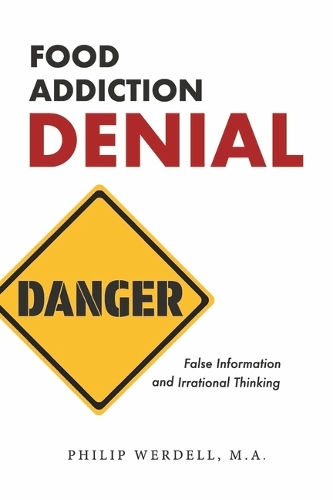
Food Addiction Denial: False Information and Irrational Thinking
(Paperback)
Publishing Details
Food Addiction Denial: False Information and Irrational Thinking
By (Author) Philip Werdell
BookBaby
BookBaby
17th January 2023
United States
Classifications
General
Non Fiction
Physical Properties
Paperback
184
Width 152mm, Height 228mm, Spine 12mm
303g
Description
Denial is a major characteristic of addiction, and it is certainly a key problem when it comes to chemical dependency on sugar and other hyper-processed foods. Denial is an issue of consciousness. A major aspect of food addiction is that those who have it do not think they have it, and those who are treating it professionally do not think that it is a serious problem.
Food addiction begins with physical craving. Physical craving distorts the hunger instinct for some people, making these people want more food than they need. This physical craving is a biochemical brain change caused by extra sugar or other hyper-processed foods. When this craving occurs, food addicts experience a slow but steady increase in their attraction to their trigger food.
There are three levels of food addiction denial: 1) cognitive denial, which is when facts are inaccurate and reasoning is incorrect; 2) biochemical denial, where addictive foods, e.g., sugar, flour, caffeine, etc., create physical craving, mental obsession, and an addictive personality; 3) social or institutional denial, where people with power in institutions central to our society's food supply hurt consumers (sometimes intentionally, sometimes unintentionally), then come up with arguments to normalize these practices and build them into the woodwork such that the very fabric of society becomes toxic. This book starts at the beginning and is primarily about cognitive food addiction denial. Biochemical and social/institutional food addiction denial are summarized in appendices A and B.
If you or someone you know is struggling with food dependency issues and questioning whether food addiction is real, this book is for you.
Author Bio
Phil Werdell is a prominent practitioner and writer in the field of food addiction. He is a graduate of Yale University, Scholar of the House, with postgraduate work in eating disorders at the University of South Florida, as well as in adult education at Columbia University. He was awarded a Fulbright Fellowship for study in India and a Corning Fellowship for the study of international business.
Mr. Werdell's career includes twenty years as an innovative college teacher and administrator at Yale University, City University of New York, College for Human Services (NYC), Campus Free College, College of New Rochelle, and Springfield College (Tampa, FL).
At age 46, after two decades in the cycle of gaining weight, losing up to 50 pounds, and then regaining the weight, Mr. Werdell learned that he was in an advanced stage of food addiction. He spent the next two years primarily focused on his own recovery. He followed the addiction model of treatment and achieved an 80-pound weight loss.
Mr. Werdell went on to become a lead therapist at a hospital-based residential treatment program for food addiction. In 1993, he founded ACORN Food Dependency Recovery Services (now SHiFT--Recovery by ACORN) and has worked professionally with over 5000 late-stage food addicts, directed a three-year training program for food addiction professionals, and founded the Food Addiction Institute.
Mr. Werdell has written several books on food addiction. He has been abstinent from sugar and his other binge foods and maintained an 80-pound weight loss since 1986.
